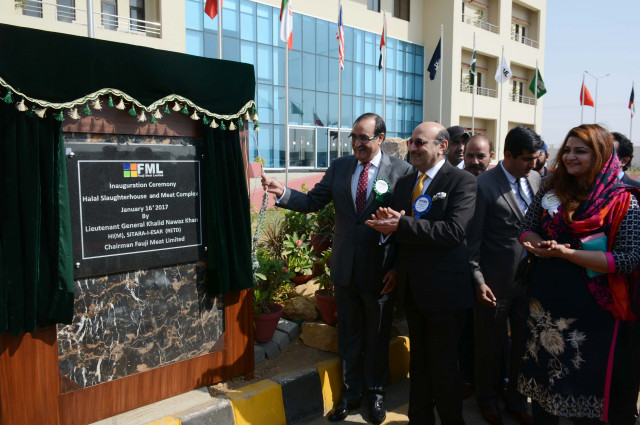Fauji Meat officially begins commercial operations
Company targets revenue of Rs16-20 billion in the next 1-2 years
PHOTO: EXPRESS
KARACHI:
Fauji Meat Limited - a subsidiary of Fauji Fertilizer Bin Qasim Limited (FFBL) - officially commenced commercial operations of its meat processing and export business on Monday.
FFBL, Group GM Finance/CEO Syed Aamir Ahsan, said the firm kick started the operations in April 2016 and booked sales revenue close to an estimate of Rs1 billion in the first nine months (April-December 2016).
"The revenue would touch Rs16-20 billion in the next 1-2 years," Ahsan told The Express Tribune on the sidelines of inaugural ceremony of the abattoir in Bin Qasim, Karachi.
This is one of the world’s largest meat processing and exporting plant established at a cost of $75 million.
The abattoir and meat processing facility has a daily production capacity of 100 tons of meat (85 tons of beef and 15 tons of mutton) in frozen and chilled categories for worldwide export.
"You, perhaps, may not find such a big plant across the world," said Ahsan. "This year {2017}, we will fully utilise the installed capacity," he said.
Meat, dairy and power: Exploring other options, Fauji Fertilizer expands business
"Our quality and processing is not less than anyone in the world," he said. He said FML would also introduce its quality products at local markets.
FFBL’s share price increased 1.24%, or Rs0.67, and closed at Rs54.29 with 5.39 million shares changing hands at the Pakistan Stock Exchange on Monday. The increase in price was attributed to restoration of subsidy on fertilisers.
Present, future exports
The plant is currently serving the GCC region (Kuwait and UAE) and China, and is in the process of obtaining formal approval for export of meat to Russia, MENA region and Central Asia.
Iran has given approval, while approvals from Saudi Arabia, Malaysia and Russia are in the pipeline. "We are confident that all these countries would approve during the years 2017-2018," he said.
"The volume of sales of halal meat stands at $300 billion. Pakistan's share in this is almost nil," he said.
Potential: Investment in halal food can win global markets
According to the Pakistan Bureau of Statistics' latest data, the export of meat and meat preparations dropped 19% in dollar denomination to $87.56 million during July-November 2016 from $108.10 million in the same period last year.
It decreased 25.19% quantity-wise to 23,107 tons in the said five months.
Pakistan has been endowed with a large livestock population which includes cattle, buffalo, sheep and goat. It has a herd size of more than 60 million animals; one of the largest in the world.
Meat Industry: Exporting Omasum can increase revenue
Responding to a question, Ahsan said, production of 100-tons-a-day is a single-shift installed capacity. With the addition of another shift, the capacity can be doubled at a nominal investment.
The firm has engaged dozens of farmers to make quality breed available on a consistent and scientific basis.
Fauji Foundation Group Chairman Khalid Nawaz said the group started off with $0.2 million and now its annual turnover exceeds $1.5 billion, making it one of the largest business conglomerates in the country with interests in more than 18 industries and having a diverse investment portfolio.

COMMENTS (7)
Comments are moderated and generally will be posted if they are on-topic and not abusive.
For more information, please see our Comments FAQ